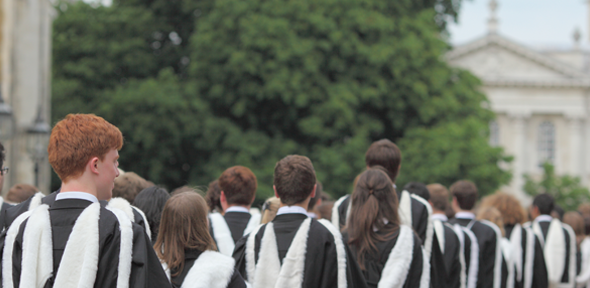
While many of us realise there is a complex relationship between the Colleges and the wider University, the precise nature of the connection is not always understood, even by staff or current students. Here, we offer staff a primer.
The collegiate structure is central to Cambridge’s success.
Cambridge is a multifaceted, multi-layered structure that has developed organically over eight centuries. Perhaps the easiest way of understanding it is to look at the functions of the College and University, how they differ and how they overlap. Let’s start at the beginning of the process, with admissions.
Admissions
Cambridge Colleges are free to select their own undergraduates for admission, subject to some minimum educational requirements set by the University. Unlike other universities, where Faculties and Departments select undergraduates for admission, in Cambridge this responsibility is held within the Colleges – a recognition of their distinctive combination of academic expertise and pastoral responsibility.
For financial reasons, each College effectively has a target number of ‘home’ (UK and EU) undergraduates it can admit each year. For medical students only, there is a quota per College. However, a College can, if it wishes, admit any number of ‘overseas’ undergraduates.
The admissions process for graduate students (those studying for a Masters or PhD) is a little different. A prospective graduate student must apply to, and be accepted by, a Faculty or Department of the University, a process handled by the Board of Graduate Studies. At the same time, students can – and most do – indicate a preference for a College. Within the College, the Graduate Admissions Tutor makes the selection, from what is a large and international field of graduate applicants.
Teaching
For undergraduates, lectures – and, in science subjects, practicals – are provided centrally by the University, and take place in the Faculties, Departments and other lecture facilities dotted around Cambridge.
By contrast, supervisions – the individual or small-group tutorials that are the gold-standard of a Cambridge undergraduate education – are arranged and paid for by the College. They are usually carried out by a Fellow or other College member, often in his or her College room. Swap arrangements between Colleges exist for small subjects and specialisms in which it is impractical for every College to have its own teaching Fellow.
Most of the College Fellows who direct studies or supervise undergraduates also hold University posts (lectureships, readerships, professorships). In financial terms, this means that the University pays the major proportion of their salaries, although the College pays for supervisions.
Most Colleges also employ some College Teaching Officers (CTOs) – whose salaries are paid entirely by the College – to supervise and direct studies in subjects where demand exceeds the supply of academics with University positions.
These CTOs and some University Teaching Officer (UTO) Fellows also bring their expertise to some of the other roles (for example, Tutor and Admissions Tutor) that are essential to the working of the College as a residential community offering pastoral as well as academic support.
The formal teaching of graduate students is the responsibility of the Faculties and Departments, but Colleges also provide valuable, informal academic benefits for graduates, offering them a peer support network, a forum in which to present new research, and the chance to develop teaching expertise through supervisions.
Research
Most research in Cambridge is carried out in the Faculties and Departments, and is funded by the University via grants from HEFCE and the various government Research Councils. Junior Research Fellowships in the Colleges are a notable exception. These are three-year positions, paid for by the College, which offer talented young academics the chance to devote themselves to research without significant teaching or administrative duties. They are the Colleges’ unique contribution to research excellence.
Facilities and pastoral support
For undergraduate and graduate students alike, the College provides key facilities: libraries and computer rooms; accommodation and catering; common rooms and bars; sporting, musical and artistic facilities; and, not least, individual pastoral support through the tutorial system. This last point is a central and distinctive feature of the collegiate system, and is a major reason for the academic success of our students and Cambridge’s extremely low drop-out rate. The University, too, provides academic and cultural facilities for all Cambridge students. Nevertheless, for most undergraduates, College will be their ‘home’ during their time at Cambridge.
Graduation
On the successful conclusion of their studies, the Colleges present their students to the University, which confers their degrees. They remain members of both College and University for life.
The genius of scale
Given the complexity of the University-College relationship, would it not be better, some ask, if Cambridge simply centralised everything and the Colleges became mere halls of residence? Not if Cambridge wants to remain in the top rank of universities worldwide, for the collegiate structure is central to Cambridge’s success.
Because of the small-scale nature of the College community and the loyalty it inspires among its Fellows, undergraduates benefit from teaching by world-class researchers, a situation highly unusual in the leading research universities. College-based supervisions encourage intellectual rigour, freedom of thought, learning and debate.
In the Colleges, generations and academic disciplines mix freely. Students and Fellows experience the breadth and excellence of a top University at an intimate level. This has been called the ‘genius of scale’.
